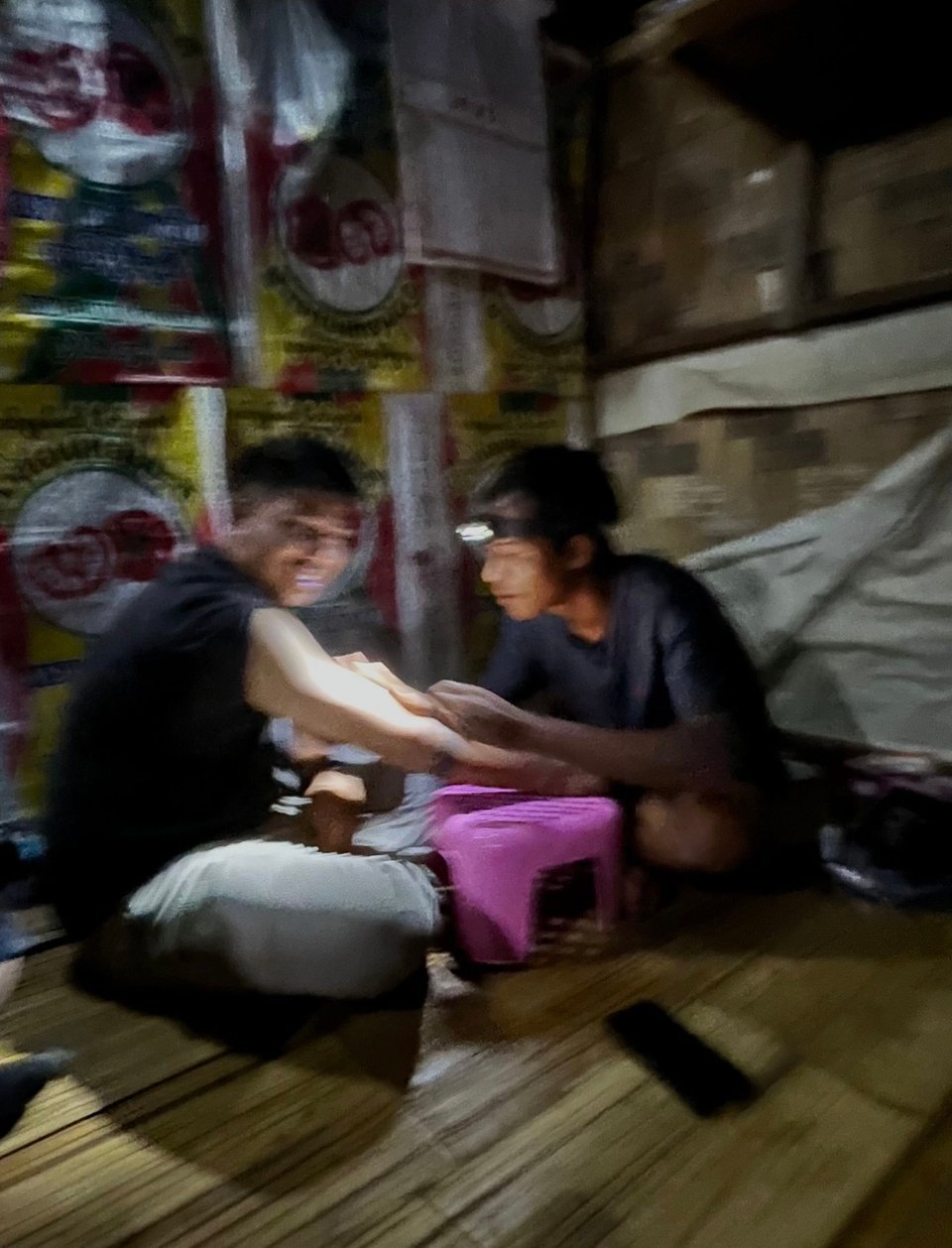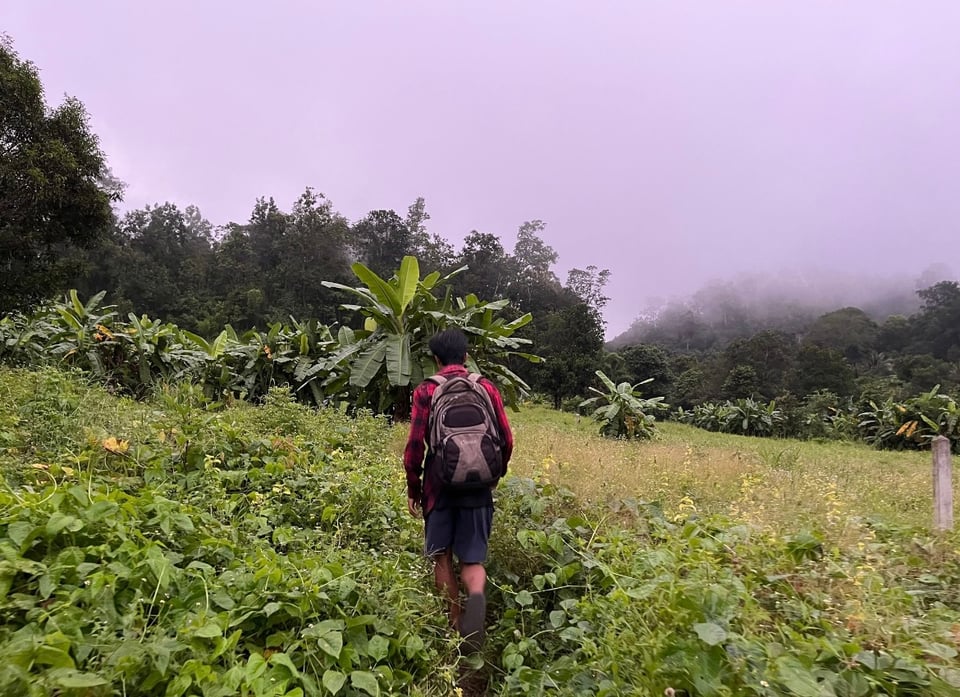A life both commonplace and extraordinary
*Seated on a raised platform made of bamboo, the home of Preh Reh, a Karenni refugee, on the northern tip of Thailand, a few miles away from the border with Myanmar. It’s nine hours to 4 a.m., when the soldiers guarding the checkpoints to the next encampment change shifts, leaving their stations unmonitored for about half an hour. It’s raining –
I’m grimy and frustrated that our departure keeps moving later into the night. The people around me notice. Yan, my Burmese stringer, shuffles out a cigarette from its box; Sai Pyae Moe, another Karenni refugee, leaves and returns with some beers. We have to wait, Yan says quietly. Sighing, I accept. Somewhere in the camp, someone strums an untuned guitar. We sit around a circle and talk.
Yan is Burmese, originally from Yangon but now living in exile in Bangkok. He’s jolly, foolhardy and, at this point of the trip, I’m starting to suspect a reckless driver. (My suspicions are confirmed when our car goes spinning along a slick mountain road two days later). There’s Preh Reh, our tall and gangly host, with the resolve of a boy who has just become a father. Sai Pyae Moe is our guide’s guide, the person getting us to the story. He’s a newer refugee, displaced by the 2021 coup. Along with several thousand other Karenni, he fled across the border to Thailand when his old camp was bombed by the Myanmar military a few months ago. Thai authorities wanted to keep this population hidden so as not to encourage more refugees from coming over but, like many governments across the world have learned, it’s not easy to disappear people. Especially, said Sai Pyae Moe, when they want to be known.
Sai has straight, floppy hair like a 2000s-era Taiwanese pop star. In his backpack, he has a flashlight, a phone charger, and a dog-eared paperback of the French novel “Papillon” by Henri Charrière. Papillon, French for butterfly, tells the story of a man breaking free of a penal colony. Sai pulls up his right sleeve, showing a tattoo that is half-butterfly, half iron chain. Preh Reh jabs at it. “Me,” he says. “I do.”
Sitting around comparing tattoos, it doesn’t take us long to realize that all four of us are the same age: 27. We were all born in the decade after uprisings in Myanmar, the Philippines, China; in the years before the Asian financial crisis and the fall of Suharto. Hip-hop was ascendant and would reach us all. The mobile phone was working its way to Asia.
The coincidence delights me but even better – it delights us all.
Preh Reh shows us more of his work on Sai’s arms and legs. Yan shows us one he got in Chiang Mai: a black silhouette of fighters mounting a flag that he got after the coup. I offer my forearm into the circle, showing the squiggles I got this year from a visiting Korean artist. “The sea,” I say, embarrassed. I motion swimming. They huddle in closer to inspect, using the light from Yan’s head torch. It's quiet until Preh Reh weighs in. “Simple…” he says in English. “Nice.”
In what is perhaps statistically likely for four 27-year-olds stuck together in a lightless encampment with time to kill, the idea soon presents itself for someone to get a tattoo. Yan bravely steps up. He flips through a folder of flash tattoos, talking out loud to Sai, as Preh Reh leans over a plastic box of rations, testing a needle powered by a small generator. I crouch in a corner, taking photos and laughing maniacally.
The machine starts its low, familiar hum.
“Video me, video me, I’m not screaming,” Yan says.
“Uh-huh. You look badass.”
“That’s all what I want to be. Badass.”
The night passes like this. Fun and childish and random. We learn that all of us have song lyrics as our first tattoos. Yan has this in Burmese, “The difference between OK and KO,” apparently from a metal song. Preh Reh has this in English: “Never give up with challenge” from a song he says he heard aid workers play in camp. I have that dastardly line from that dastardly Oasis song. You know the one.
Eventually, when the energy fades a little, I ask Preh Reh about being a father. He responds, then comes for my jugular, asking in halting English: Why do you work for an American paper? How did you end up over there? I’m stunned by what a good question it is.
There are parts of adult life that feel inert. Days buried under feeling self-conscious or petty or stuck. Then there are moments like these where it feels like a channel opens. Under a cloudy night sky, you meet a few strangers alive in the same winking span of time that you are, as interested in the story of your existence as you are in theirs. Like people have done across centuries, you marvel at what is similar and what is different.
“You are lucky,” Pray Reh tells me.
We’ve been talking long enough for me to know that lucky is what he means. Not different. Just lucky. The American writer Brandon Taylor got me interested recently in the 19th century literary movement naturalism that is premised on the ethic, briefly summarized, that “no range of human experience is free of the moral complexities and ambiguities which Milton set his fallen angels to debating.”
“Naturalism reflects an affirmative ethical conception of life…” Donald Pizer, an authority of literary realism wrote, “It involves us in the experience of a life both commonplace and extraordinary, both familiar and strange, both simple and complex.”
Many other unlikely things happen on this trip – at one point, a hunchbacked senior combat medics in a 74-year-old ethnic rebel group insists I crawl into his bunker and “test it out,” for example. But in the weeks since coming home, I’ve thought disproportionately about that one night where Yan got his flash tattoo of a polaroid going up in flames. I’ve applied to this memory a lesson from my therapist, which is when something feels big and significant to you, you should trust it was also special for other people. Reality is not something you own but something we share. Imagining that your life is only your own is to miss the whole point.
Preh Reh told me before I left Thailand that he’d been applying to relocate to Australia. We joked about him opening his own tattoo studio in Melbourne, though I’d spoken to enough refugees in enough camps to know that third-country relocation is exceedingly rare and often steeped in disappointment.
A few days ago, someone passed along the news that Preh Reh had left the camps. With his two baby daughters and his wife, he’d packed up and left. I messaged him on Facebook, though I didn’t expect him to respond. Signal was always bad along the border. Unless he’d really made it out? All the way to Australia? A little green circle flashed next to his name. As I stared at the screen, three floating dots appeared inside a speech bubble. He was typing.


I paused my memoir-reading streak recently to dip my feet back into some fiction. I quite enjoyed "If I Survive You," a debut collection of short stories by the Jamaican American writer Jonathan Escoffery. It takes place in Miami, which I've visited twice, and I liked being able to envision the cityscapes as he described them destroyed by hurricanes. I've now just started "All the light we cannot see" by Anthony Doerr, which is an ODD CHOICE for me because it's set in WW2 — the EUROPEAN theater to boot. But the book looked fat and enticing on the table at Kinokuniya, and I have to say: I've been absorbed since page one.
One last trip for me in the region — Indonesia, on Sunday, to explore peatlands — then it's off to L.A. for the holidays.

Your friend,
Reb